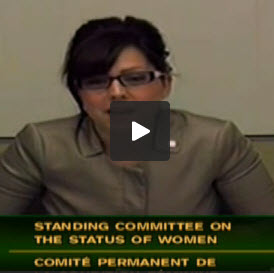“Quebec, Ontario and Toronto Police departments deserve kudos on proactive models to address harassment. Please take the time to view the March 26th Status of Women Committee hearing.”
In my opinion the testimony at March 26th Status of Women subcommittee looking into workplace harassment in the Federal work place was inspirational. Because it does take time to view the recordings and, in response to comments submitted to my website, I decided to offer what I found most interesting.
The first speaker was Cindy Viau of Quebec from the Help and Information Centre on Harassment in the Workplace. In 1980 the Quebec provincial government acted proactively and created Ms Viau’s not-for-profit group as an independent outside agency for all people who work in Quebec. The Status of Women committee members asked many questions to draw out Ms Viau’s considerable experience and knowledge of work place harassment. Highlights of the testimony included:
- men and women access the group, although women do so in much greater numbers;
- some complaints of harassment were sometimes dismissed by their unions and required third party intervention;
- face-to-face training for organizations was invaluable.
Quebec is the only province with a publicly supported third party group. The group has influence and provides a great service however does not seem to have any enforcement power.
The second speaker, Deputy Chief Michael Federico from the Toronto Police Service (TPS), described how TPS became an industry leader for change and diversity in the international policing community. In-class training at the annual re-qualifications reinforces the expectation of all TPS officers to actively contribute to a safe and respectful work place.
Highlights of D/Chief Federico’s testimony included:
- the cost benefits of training;
- evidence that the Toronto Police Service has become an employer of choice. This can be found in the increase of female police officers from 18% (the Canadian National average) to 29% in the past ten years.
- the contention that the organization’s bottom line has blossomed because of increases in productivity, retention of skilled officers, decreased sick leave and court ordered cash awards.
There was no doubt that Toronto Police Service believes this is a leadership issue. Supervisors are held to account if there is a failure in the process.
In 2010, Ontario enacted Bill C-168. The act amended the Health and Safety Act of Ontario, directly addressing harassment and violence in the work place. In response TPS activated a whistle-blower call line with mechanisms in place to protect callers’ anonymity. Prior to that:
- In 2006, TPS created a Diversity Management Unit to coordinate human rights issues and address barriers and gaps to make the workplace more inclusive.
- In 2007 TPS proactively partnered with the Ontario Human Rights Project Charter; and
- In 2008 TPS created an internal support network for gender, race, culture, sexual orientation and religious backgrounds. Training is continually evolving with the focus on raising awareness of all members and providing the tools to enable supervisors to take action.
I encourage you to check out this video.


